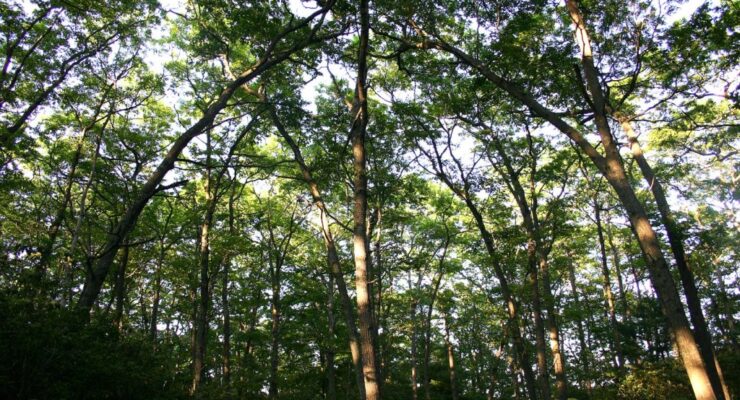Megan Cotter: Rhode Island Needs New Path For Forest Stewardship
Megan Cotter chairs the Special Legislative Commission to Evaluate and Provide Recommendations on Proper Forest Management for Fire Prevention. Ms. Cotter represents Richmond, Hopkinton, and Exeter in the RI House of Representatives. The following op-ed by Rep. Cotter was printed here with her permission.
Fifty-four percent of Rhode Island is forested, which is impressive considering it’s the second-most densely populated state in the nation. It’s also quite a resurgence; by the mid-1700s, settlers’ agriculture had reduced tree cover in the area to just 31 percent, down from 95 percent before their arrival a century earlier.
While Rhode Island has long recognized the value of forests, establishing its Forest Commission back in 1906, today we are not giving forest stewardship the priority it deserves.
This is evident in the increasing frequency and severity of forest fires. In April, 350 acres were scorched by a wildfire that began in Queen’s River Preserve in Exeter. Fortunately no one was hurt and no homes caught fire, thanks to the great work of many local firefighters, but it was Rhode Island’s largest forest fire since 1942. And it was less than a week after another fire burned more than 150 acres at the Big River Management Area in West Greenwich. Several smaller forest fires also burned that week, fueled by dry conditions and dead wood.
Of course, this problem isn’t unique to Rhode Island. Our neighbors in Canada have been besieged by record-shattering wildfires this year, billowing so much smoke so far that it triggered air quality alerts here, and even reached Europe.
The fact is, our climate is changing. Hotter, dryer conditions and more frequent extreme weather present new challenges to maintaining our forests. We need to adapt to this new reality with a new and more vigorous approach to forest management.
This session I sponsored legislation (2023-H 6342) creating a new House commission to determine the best action for improving forest management. Our commission, which began working last week, brings together experts and stakeholders to identify our strengths and weaknesses, and how our state can best direct our resources toward effective forest management in our increasingly volatile environment.
We need to engage in more modern, effective means of maintaining our forests, much of which are privately held land. That means we must work as partners with landowners, helping them safely manage the risks of fires, for their benefit and the safety of the public. We should collaborate with land trusts and conservation organizations, many of which already engage in outstanding stewardship practices and can provide valuable guidance.
Putting in the planning and maintenance work necessary to prevent forest fires has benefits far beyond public safety. Forests directly reduce carbon dioxide from our atmosphere, play a major role in filtering pollution from our groundwater and cool the land in the summer. Of course, they provide many intangible benefits too, as any hiker or kid in a tree fort will attest.”
Forest management is not just for the wider expanses in the western part of our state. Urban trees are just as critical, providing vital stormwater control and cooling during the summer. According to the U.S. Forest Service, Providence found that its 415,000 trees provide $4.7 million in environmental benefits annually, and a study of five U.S. cities has shown that every dollar invested in urban forest management results in benefits ranging from $1.37 to $3.09.
Keeping our forests healthy and encouraging the conservation of forested land should be a high priority for Rhode Island. I look forward to helping to forge a new path forward toward better forest stewardship in our state.

You can learn more about the author, Megan Cotter, at her web page.
The 12 members of the Special Legislative Commission to Evaluate and Provide Recommendations on Proper Forest Management for Fire Prevention:
- Chair Megan Cotter
- House Minority Leader Michael Chippendale
- Tee Jay Boudreau, Department of Environmental Management
- Armand Niquette, Rhode Island State Association of Firefighters
- Marc R. Pappas, Rhode Island Emergency Management Agency
- Chief Scott Kettelle, Rhode Island Association of Fire Chiefs
- Scott Millar, Forest Conservation Commission
- Kate Sayles, Rhode Island Land Trust Council
- William Fortune, Forest Conservators Organization
- Catherine Sparks, Former Rhode Island Chief of Forestry
- Dick Went, Rhode Island Association of Conservation Districts
- John Torgan, The Nature Conservancy, RI Chapter
The commission began meeting at the State House on September 12.

September 24, 2023 @ 2:43 pm
In addition to my other comment, I do think forest management for a healthy and resilient forest is needed as outlined in the main post. For that a Resource Manager, either employed by the town or contracted to work with the town, who deals not just with forests but with other open space issues such as pests, invasives etc, and who can keep abreast of current threats and cures and remediations and provide education on the same to the public would be beneficial and in line with the town’s comprehensive plan. This would also take some load off the Conservation Commission. Our open spaces are valuable in protecting our groundwater, providing habitat, recreation, and all the other services and should be considered on a par with other important town issues.
September 22, 2023 @ 4:49 pm
The Charlestown Climate Resiliency Committee report highlighted the need for a town arborist and a forest management plan. This makes a lot of sense especially given the condition of the forest along Route 2. Because of a gypsy moth infestation a few year back there are many dead trees along that route which during a dry period will act as tinder for a forest fire that could threaten many homes in Charlestown. The Resiliency Committee did their due diligence in addressing this potential problem but the Town Council has chosen to look at lower priority items. The local fire departments are aware of the danger forest fires present and have plans to deal with that inevitability. However, planning to prevent such fires is lacking among town administrators.
September 20, 2023 @ 11:08 am
We want safety but also for forests to work in the way they do for a multitude of benefits. Public education is needed so that trees are not unnecessarily cut on house lots too. Reducing lawn and adding shrubs and trees helps numerous creatures including us. We need our forests.